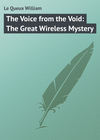Loe raamatut: «The Lost Million», lehekülg 6
Chapter Eleven
A Sensation in the County
The paragraph I read was truly a startling one, brief, but amazing.
Apparently few details had arrived in London, for it read thus —
“Mr Guy Nicholson, son of the late Mr Nathaniel Nicholson, the well-known ironmaster of Sheffield, and for twenty-five years Member for South Cheshire, was yesterday morning found dead under somewhat remarkable circumstances. It appears that he entertained some guests at dinner at his house, Titmarsh Court, near Corby, Northamptonshire, and the last of his friends to depart left about midnight. About two o’clock in the morning a friend who was staying in the house, and whose room was directly over the library, was awakened by a man’s piercing shrieks, as though of horror. He listened, and heard a loud thumping sound below. Then all was quiet. It being the first time he had been a guest there, he did not alarm the household, but after lying awake for over an hour dropped off to sleep again. In the morning, however, the maid who went to clean the library found the door locked on the outside, as usual, but, on entering, was horrified to discover her master lying upon the carpet, he had been dead some hours. Considerable mystery attaches to the affair, which has created a great sensation in the neighbourhood, where the young man was well-known and highly popular.”
What could actually have happened!
I read and re-read that paragraph. Then I rang up Stokes, my chauffeur, on the telephone, and we were soon tearing along the Northampton Road.
Within a couple of hours we turned into the big lodge-gates of Titmarsh Court, which I found was a fine old place, upon which huge sums must have been spent by Guy’s father in the way of improvements. It was a splendid specimen of the old, moated manor-house, situated in well-timbered grounds and approached by a long shady avenue of chestnuts, which met overhead.
A young man-servant opened the door, and was inclined to be uncommunicative, until suddenly I caught sight of Shaw’s grey car standing against the garage, and inquired for him.
In a few moments he came forward, sedate and grave, and somewhat surprised, I think, at my presence there.
“This is really a most terrible thing, my dear Kemball,” he exclaimed, his face pale. “I only knew of it late last night. The police and doctors seem to have kept the affair secret as long as they could.”
“I saw it in the paper, and came over at once,” I said. “What is your opinion?” I asked eagerly. “Is foul play suspected?”
“I really don’t know,” was his vague answer, as he stood in the wide, old-fashioned hall. “It’s a terrible thing, however. Poor Asta! she is overcome with grief, poor girl.”
“Ah yes?” I sighed. “She was very fond of him; I realised that the other day.”
Together we walked into a handsomely furnished sitting-room – the morning-room I supposed it to be – and there I was introduced to a fussy elderly man in tweeds named Redwood, the local doctor from Corby. He was a bluff, red-faced, clean-shaven man, a good type of the fox-hunting doctor of the grass-country.
“Well, Mr Shaw,” he exclaimed briskly, “Doctor Petherbridge, from Northampton, and myself have made a post-mortem, and we have come to the conclusion that death was due to natural causes – inflammation of the brain. We have made most minute examination, but can discover no trace whatever of foul play.”
“Nor of suicide – by poison, for instance?” asked Shaw, leaning with his back against the table, while the sun shone brightly across the pale blue carpet.
“Certainly not. We have had that in mind, but fail to find any trace whatsoever, though Petherbridge is taking the contents of the stomach into. Northampton for analysis, in order to thoroughly satisfy ourselves. Our conclusions are, however, that probably while seated in his armchair in the library reading his paper, as was his habit before going to bed, he was suddenly attacked, shrieked with pain, and quickly collapsed. Such fatal seizures are by no means uncommon.”
“But, doctor, the papers say that a noise of hammering was heard,” I remarked.
“Captain Cardew, who heard the shriek, is not actually certain about the hammering, it seems,” replied Shaw. “The poor fellow was in the best of spirits and quite well when Asta and I left him about a quarter-past eleven. We dined here with some people named Sweetman, the Vanes from Oundle, and Mr Justice Michelmore, who is staying with them. The judge was talking with him on the steps when we left.”
“Nobody who partook of the dinner felt any unusual symptoms, or one might suspect ptomaine poisoning,” remarked the doctor from Northampton, a short, grey-headed little man, who had at that moment entered the room. “My distinct opinion is that, though the affair appears most mysterious, yet it is due to perfectly natural causes.”
“And I suppose that is the evidence you will give before the Coroner to-morrow, eh?” Shaw asked.
“Precisely. I shall have a searching analysis of the stomach, of course. Indeed, I’m just off to Northampton for that purpose. But I do not anticipate finding anything. Young Nicholson was not the kind of fellow to take his own life.”
“No,” I said; “he certainly did not strike me as having any tendencies towards suicide. Yet, from what the papers say, the affair is most mysterious.”
“Oh, the papers!” laughed Shaw, derisively. “They’re always sensational. A good story means hundreds of pounds to them. But,” he added, “I must be off, Kemball. I was just going when you came. I have to be on the Bench this morning at twelve.”
“Please express my most sincere condolence with Miss Seymour,” I said. “You and I will meet again soon, no doubt.”
“My dear fellow, just come over whenever you like. Better ring me on the ’phone to see if we are at home, for we’re often out in the car this fine weather.”
And, taking my hand, the man who in his dual life was a county magistrate, and was about to sit and administer justice from the Bench, gripped my hand and went out, followed by the Northampton doctor, who a moment later I saw with two large glass jam-jars in his hand. Yet almost directly after I heard a low, peculiar whistle emanating from an adjoining room. Shaw was whistling to himself – even though the house was a house of mourning!
Left alone with Doctor Redwood I began to question him, explaining that I was a friend of the man now dead.
“Well,” he said, “I can’t tell you very much, Mr Kemball. Captain Cardew, who was Nicholson’s guest, is in the library. At least I left him there a little time ago; let’s go and find him.”
So he conducted me along a well-carpeted corridor where the doors, I noticed, were of polished mahogany, and opening one, I found myself in a long, low, old-fashioned room, lined with brown-backed books from the floor to the panelled ceiling. At the table a tall, fair-haired, military-looking young man was seated writing letters.
I introduced myself, whereupon he rose, and expressed his readiness to answer any questions, as I was poor Guy’s friend, the doctor, having some matters to attend to with his colleague, leaving us alone. When he had gone I closed the door. Then, turning to the dead man’s guest, I said in a low voice – “I wonder, Captain Cardew, if I might speak to you in absolute confidence?”
“Certainly,” he said; “we are mutual friends of poor Guy’s.”
“Well,” I exclaimed; “first, will you tell me, frankly, your private opinion of this terrible affair? Has there been foul play?”
I saw that he hesitated.
“Well,” he replied, “there are certain curious circumstances which no doubt point to such a conclusion, although I understand that the doctors have had no hesitation in pronouncing death to be due to natural causes.”
“Would you mind describing to me, as far as you are able, what you heard in the night?” I said. “I have a reason for asking this. No doubt you have already several times told your story.”
“Yes. To the medical men and also to the police,” he said. “Well, it was like this. I’m quartered at Canterbury, and Guy, who was in my regiment and retired a year or so ago, asked me to spend a few days with him. I came here three days ago and found him in the highest of spirits, and very keen about tennis. He took me over to see a man named Shaw, and his daughter, of whom he was, I know, very fond. The night before last he gave a little dinner to a few people, and Shaw and the girl were here. After dinner we all went out on to the lawn for coffee. The place was hung with Chinese lanterns and looked charming, but all Guy’s attention was devoted towards entertaining Shaw’s daughter. I saw them cross the lawn in the moonlight and stroll into the grounds together; and when they came back I overheard Shaw expressing his annoyance to her at her absence. Shaw chatted with Justice Michelmore a good deal, while I had a Mrs Vane, a rather stout person, put upon me for the evening. I tell you I envied Guy, for the girl is really delightful.”
“Was there any bridge?”
“Yes, for about an hour in the drawing-room. Shaw and the Judge did not play. Before eleven the guests began to depart, and the Vanes, the last to leave, went about midnight. After they had gone I sat in the library with Guy for half an hour, and had a cigar. He was full of Asta Seymour, and when I asked him why he did not propose to her he reflected a moment, and then told me, in strict confidence, that he would do so at once – but for a certain circumstance.”
“Did he explain that circumstance?” I asked eagerly.
“No. I pressed him, but he refused to tell me. ‘It is my secret, Teddy,’ he said. ‘A secret which, alas! bars my happiness for ever.’ As we smoked, I noticed that, contrary to the rule, the long window yonder was open, and remarked upon it. He rose, and saying that the servant had probably forgotten it, closed it himself and barred the shutters. You’ll see they are strong shutters, and they were found in the morning closed and barred just as he had left them. Indeed, I unbarred them myself.”
“Then you left him here?” I asked.
“No. He turned off the light and came out with me, locking the door after him, for it seems he’s always careful to have every door on the ground floor locked at night. He came upstairs with me, wished me a cheery good-night outside my own door, and, promising to motor me into Oakham on the morrow, went along to his room. That is the last time he was seen alive.”
“What did you next hear?”
“I was awakened by a loud, piercing shriek – a man’s shriek of intense horror, it seemed. No one else slept in this wing of the house, or they must certainly have heard it. I roused myself at the unusual sound, for I was thoroughly startled and awakened by it. The clock on my mantelshelf struck two. I waited for some minutes, when I heard a noise which seemed to be below in the library, as though some one were moving about trying the door and hammering upon it. This caused me to wonder, and I held my breath to listen further. I suppose I must have lain like that for fully an hour. It was my intention if I heard anything further to go along to Guy’s room. I had, of course, some hesitation in arousing the household. But as I heard nothing further, I suppose I fell asleep, for the sun was shining when I awoke again. I got up, and was crossing to the window to look out when I heard a woman’s cry for help. So I rushed out in my pyjamas, and, descending the stairs, found poor Guy lying just here,” and he crossed to a spot about four yards from the door, and pointed to the red carpet.
“Was the room in any disorder?” I asked.
“Not as far as I could see. The shutters yonder were closed and barred, so I opened them and then tried to rouse my friend. But, alas! I saw by the ashen look upon his face that he was already dead. He was still in his dinner-jacket – just as I had left him. Of course you can well imagine the scene and the horror of the servants. Poor Guy – he was one of the very best.”
“What is your theory, Captain Cardew?”
“Theory! Well, I hardly know. I was a fool, and I shall never forgive myself for not raising an alarm when I first heard his shriek. I ought to have known that something was wrong. But there are moments in one’s life when one, being awakened suddenly, acts foolishly. It was so with me.”
Chapter Twelve
The Cry in the Night
“After leaving you at the door of your room he must have returned to the library,” I said to Cardew. “Were all the lights out when he came up with you?”
“By Jove! No, they were not,” he replied. “He didn’t turn out the light in the passage here just outside the library door. I have not remembered that point until this moment!”
“Did you see any newspaper about?”
“Yes, there was one lying near that armchair over there,” and he pointed to a big saddle-bag chair in dark green plush, where a large embroidered cushion of pale violet velvet lay crushed and crumpled, just as the unfortunate man had arisen from it.
“Then it is probable that after leaving you he made up his mind to return to the library and read his paper as usual,” I said. “He did so, and, lighting up again, flung himself into his favourite chair to read.”
“And while reading, he had the fatal seizure – eh? That, at least, is the theory of the police,” the Captain said.
“But you say that the housemaid, when she came to clean the room, found the door locked from the outside?” I remarked. The reason I cannot tell, but somehow, while we had been speaking, I thought I had detected a curious mysterious evasiveness in the Captain’s manner. Was he telling all he knew?
“Yes,” he said. “It was undoubtedly locked from the outside – a most mysterious fact.”
“Why mysterious?” I queried. “If Nicholson wished to commit suicide in mysterious circumstances, he could easily have arranged that he should be found behind locked doors. He had only to pass out by the door, lock it, and re-enter by the library window again, and bar that. I noticed as I came in that there is a spring-lock on the front door – so that it locks itself when closed!”
“Ah! I had not thought of that,” the Captain declared. “Of course, by such proceeding he would have been found locked in.”
“But you have suspicion of foul play,” I said; “you may as well admit that, Captain Cardew.”
“Well, I see no good in concealing it,” he said, with a smile. “To tell the truth now, after well weighing the facts for more than twenty-four hours, I have, I admit, come to a rather different conclusion to that of the medical men.”
“And I agree with you,” I declared. “One point we have to consider is what occupied poor Guy from the time when he left you until two o’clock. He would not take an hour and a half to read a newspaper.”
“No, but he might have been reading something else. He was not writing letters, for the same thought occurred to me, and I searched for any letters he might have written, but I could find none.”
“The question arises whether he returned to the library in order to meet somebody there in secret,” I exclaimed. “They may have passed in by the window to meet him, and afterwards out by the door, and eventually by the front door.”
His round face, with the slight fair moustache, instantly changed.
“By Jove! I’ve never thought of that!” he gasped. “Then your theory is that from half-past twelve till two he was not alone, eh? What causes you to suspect that he did not die of natural causes, Mr Kemball? I’ve been quite frank with you; will you not be equally straightforward with me?”
“Well, I have strong reasons for believing that it was to the interest of certain persons that he should die suddenly,” I said; “that’s all.”
“Will you not name the persons?” he asked.
“Not until I obtain proof. I may be mistaken. I may be grossly misjudging perfectly innocent persons, therefore I make no specific charge against anybody,” was my calm reply, as I stood gazing around the large sombre old room, whence a beautiful view of the long avenue and the park was spread. It was a quiet, silent, restful apartment, in which the previous owner – a great politician and writer – had spent many studious hours.
“But if you entertain any well-founded suspicions, ought you not to put them to the police?”
“And allow the local constables to bungle a very difficult and delicate inquiry! Scarcely, I think,” I replied, with a smile, still looking about me, and wondering what had really happened in that long, old-world room during the silent watches of that fatal night.
“Nothing has been touched here,” Cardew remarked. “I picked up the newspaper, but everything is left just as I found it when I rushed down at hearing the housemaid’s horrified cry.”
The room was certainly in no disorder. On the big square table, covered by a green plush cloth, were a number of new books, and in the centre a great silver bowl filled with roses. The writing-table – an old-fashioned mahogany one – was, I noticed, littered with letters, bills, and receipts, the neglected correspondence of a careless man, and as I stood there I noted that the great easy-chair wherein he had sat was placed exactly opposite the window, while within reach, upon a small neat shaft affixed to the wall, was the telephone instrument. Strange that, if he felt himself suddenly ill, and had been unable to summon assistance, he did not ring up on the telephone.
“The hammering you heard – was it quite distinct?” I inquired.
“Quite. It seems entirely feasible now that he was striving to get out of this locked room.”
The point that the door had been locked from the outside puzzled me considerably. But a fresh suggestion arose within me – namely, that after every one had retired, a servant, remembering that the window was open and the door unlocked, had gone down and seen to them. Yet she would in that case have found her master in the room, with the light still burning. No: the only explanation was that the key had been turned by one of the servants while passing along the corridor after her master’s return there, and while on her way to bed.
Yet, however one viewed the tragic affair, it was full of most remarkable features. There was mystery – a great and inexplicable mystery – somewhere.
And that mystery I now intended, at all hazards, to solve.
With that object in view, I interviewed the housemaid who found the body of her young master, and listened to her story from her own lips. Probably the whole household considered me to be highly inquisitive; nevertheless, I pointed out to them the earnest necessity of clearing up the matter to everybody’s satisfaction, and both to the housekeeper, a witty woman, and to the other servants, I declared that the facts were full of grave suspicion.
The inspector of County Constabulary was not highly intelligent, and as soon as the medical men had given their opinion he ceased to take any further professional interest in the affair. It was a sudden death, and with such occurrences the police have only to attend the inquest and formally report.
The officer was, I think, rather piqued at the persistency of my inquiries, for when I pointed out to him the suspicious circumstance of the locked door, he point-blank told me that the medical declaration was quite sufficient for him.
The girl, Kate Hayes, who discovered her master – a dark-haired, good-looking maid, about twenty-six – had been eight years at Titmarsh Court. It was Mr Guy’s habit always to read his paper before going to bed, she told me, as we stood in the long servants’ hall.
“I often find the library door unlocked before I go to my room, sir, and the night before last it was unlocked.”
“Did you lock it?” I asked quickly.
“No, sir. I once locked Mr Guy in, so I always look inside now, before securing it,” she replied. “I looked inside, and found Mr Guy there. He was then taking a book down from one of the shelves near the window. I apologised for intruding, and wished him good-night. ‘Good-night, Hayes,’ he replied, and I closed the door and left him. I heard nothing in the night. But when I went to the library door next morning I found it locked. I recollect it was locked, because at first the key would not turn. At last I succeeded in opening the door, when the first sight that met my eyes in the faint grey light through the chinks of the shutters was poor Mr Guy lying crouched up, his knees nearly touching his chin and quite dead.”
“You are absolutely certain that the window was quite securely closed?” I asked.
“Captain Cardew opened it, sir. I ran away to fetch the other servants.”
Here again the Captain showed some disinclination thoroughly to probe matters, for he interrupted, saying —
“I don’t see how questioning the servants will assist us. We already know all that they know.”
“What we want to discover is whether poor Nicholson received any visitor clandestinely during the early hours of the morning,” I said. “To me, it seems very much as though he did.”
“Then you are directly opposed to the medical theory?” he exclaimed.
“And so are you, are you not?” I remarked.
“In a manner, yes – but not altogether. We must credit doctors with a certain amount of knowledge where death is concerned.”
“I credit them with every knowledge,” I hastened to assure him; “only in this case, I fear they have not sufficiently weighed over all the known and indisputable facts.”
“If there had actually been foul play, there would be traces of it,” he said.
“Not always,” I replied. “Many cases of secret assassination have been declared by doctors to have been deaths from natural causes.”
I saw that the servants, all country-bred, ridiculed my suspicions. Doctor Redwood had said that their master had died of brain disease, and that was sufficient. The police, too, were quite satisfied, and the young man’s relations, two of whom arrived in hot haste while I was there, of course accepted the verdict of the medical men – the evidence which would be given at the inquest on the following day.
To me, it was a curious circumstance that Cardew, when he heard the shriek, had not attempted to investigate its cause. True, he had listened, and the cry was not repeated. I should have regarded his apathy as suspicious if I myself had not more than once, when dreaming, awakened suddenly, believing that I had heard a cry of distress.
The shriek of terror – nay, of horror, Cardew described it – was, in itself, a most peculiar circumstance. There is a distinct difference between a cry of pain and a shriek of horror.
No; I felt certain that the medical men had not sufficiently considered that very singular point. But when I tried to argue with the Captain, he merely declared that the cause of the shriek would never be explained. Perhaps it was the sudden knowledge that he was dying that had terrified him.
I intended, however, to seek further explanation. It was ever upon my mind that the man who had died so mysteriously intended to visit me on Sunday, and to reveal to me something – something concerning Harvey Shaw.
Shaw was a guest that evening, but it was proved beyond the shadow of a doubt that he had left the house two and a half hours before, accompanied by Asta. It was therefore my intention at once to satisfy myself whether Shaw could have returned, unknown to the girl, and re-visited Titmarsh Court.
I confess openly and frankly that I suspected a crime. Hence, I spared no effort in thoroughly investigating the curious circumstances – in doing work which the police would have done had not the declarations of the two doctors been so very positive and emphatic.
I saw the body of my friend lying in a darkened bedroom upstairs, and covered with a sheet. I did not remove the shroud. I was too horrified. A post-mortem had been made, and the corpse was waiting for the arrival of the coffin.
What had the dead man intended to reveal to me? He had evidently discovered something detrimental to Shaw. Of that I felt assured, for had he not admitted as much?
“Did poor Guy appear his usual self before the affair?” I asked Cardew some half-hour later, as we again stood together in the long sombre room wherein he had died. The atmosphere was heavy with the oppressive scent of the roses, and about the silent apartment there seemed an air of mystery.
“Well, to tell the truth, I did not notice anything unusual in his manner at the time. But since – now that I have reflected – I recollect that he seemed extremely anxious concerning Shaw’s daughter – as though he were apprehensive of something, and was in despair.”
At that moment the Captain was called out by one of the servants, who told him that the police superintendent from Northampton would like to see him. Therefore I was left alone in the room, and was thus afforded opportunity to examine it.
I looked at the big comfortable chair in which the unfortunate man had sat, and tried to picture to myself what had occurred there, in the silent watches of the night. Why had he given vent to that shriek of horror? What had he seen?
Surely he had received some fearful, appalling shock, or such a piercing, heartrending shriek would never have escaped a man’s lips.
I examined the window, the shutters, the lock on the heavy door of polished mahogany; but nothing caused me curiosity – nothing had been tampered with.
My own theory was that Guy Nicholson, whilst reading his newspaper, had seen something, and that, after shrieking in horror, he had beaten with his hands upon the door, in frantic endeavour to escape from that room. Imprisoned there, he had received some fatal blow before he had time to unbar the window, and had sunk upon the floor and expired in agony.
But what was the something which had cost a man his Life?



















